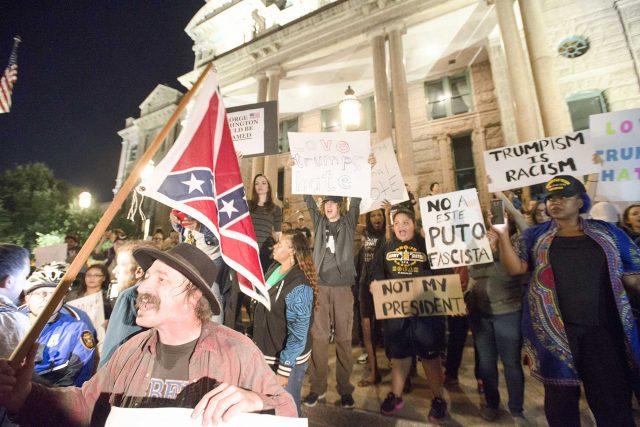By Alexis Poe/ reporter
Missiles, bombs and gunfire — U.S. military veterans have faced them all to ensure Americans keep their freedom, and SE Campus recognized some of them Nov. 7.
Students from Dianne Suarez’ American Literature Since 1865: Perspectives of the Peacekeepers class presented war stories based on interviews with veterans.
Student veteran Michael Mercado said he attended college on a partial football scholarship but decided it wasn’t for him. Looking for direction and excitement, he joined the U.S. Army Infantry in 2008, finding just that.
“I met the best brothers I could ever ask for in the service,” he said.
Mercado deployed to Afghanistan in 2010. One day, his superior told him to drive the third truck rather than the first as usual. Suddenly, two rockets propelled toward the first truck and nearly struck it. They hit a wall, leaking their fluid and disabling them. He believes a guardian angel watched over him that day because if he was driving truck one, he could have been hit.
None of the soldiers he was deployed with were killed, but many were injured, himself included. He was medically discharged in 2014.
“It should be mandatory for everyone to serve for two years,” he said. “If I ever become president, I would push for that.”
Student Noor Abdulsattar lived in Iraq and witnessed the war as a child. Bonded over the experience of war, Abdulsattar interviewed her close friend Ahmad Abdelatif, who served in the U.S. Army.
Abdelatif joined the Army determined to help pay for his younger brother’s college and put a dent in the mountain of hospital bills that piled up when his mother was diagnosed with breast cancer.
In 2003, he witnessed the destruction of the Saddam Hussein statue by Iraqi citizens and U.S. troops.
Abdelatif left active duty in 2006 and served in the Army Reserve until 2015.
Abdelatif recommends the military to those who want to serve their country, but he warns “a brave heart is imperative. It’s dangerous.”
Student Kendal Bolton interviewed her grandmother, Bonnie Sims, who joined the Women’s Army Corps in 1974 as a reporter. Sims was part of the first group of women to train at Fort Jackson in South Carolina with the male soldiers. She joined the service to escape an unhealthy relationship and travel.
Right after joining, Sims witnessed a head-on collision and quickly submitted an article to her editor covering the accident. Due to low public opinion of the U.S. military during the Vietnam War, Sims’ story was scrapped. Her editor would not publish any negative press. Instead, she was assigned to write an article on the comforts of home.
Sims also became the target of neighborhood gossip. Many of the women near her would say women in the Army were all lesbians with no chance at raising a family. She left the Army to start a family in 1975.
She recommends women and men join the military for the life skills as well as the financial benefits of college tuition and health insurance.
“It teaches you how to handle any situation,” she said.
Sims said women should be included in the draft, but when asked if she would want her daughter to die in a war, she said she didn’t.
“No, but I wouldn’t want my son to die either,” she said. “That doesn’t mean they shouldn’t be part of the draft.”
Student Lucas Ondimu told of veteran Samuel Onchiri, a Kenyan immigrant who joined the Marine Corps in 1999.
Onchiri deployed to Kandahar, Afghanistan, where he helped administer humanitarian aid. While there, one of his close friends was wounded by an improvised explosive device, had to be evacuated and had his leg amputated.
Onchiri left the Marine Corps in 2004 due to the intense physical demands but currently serves in the reserves. He also believes in mandatory military service.
“Deployment in particular changes you as a person,” he said. “It makes you realize there is a much bigger world outside of our own.”
























